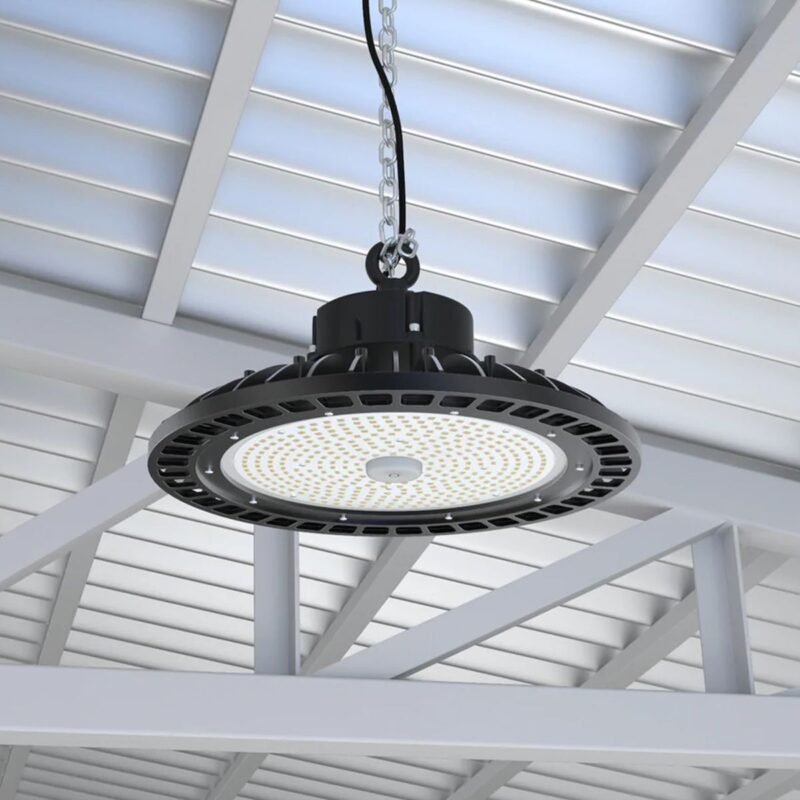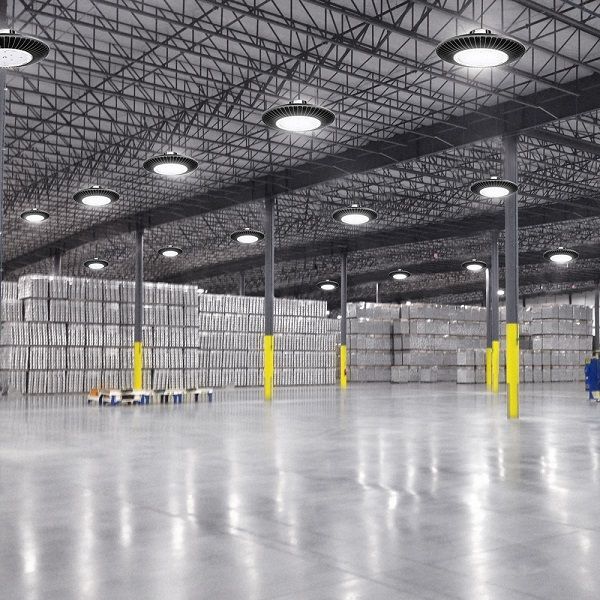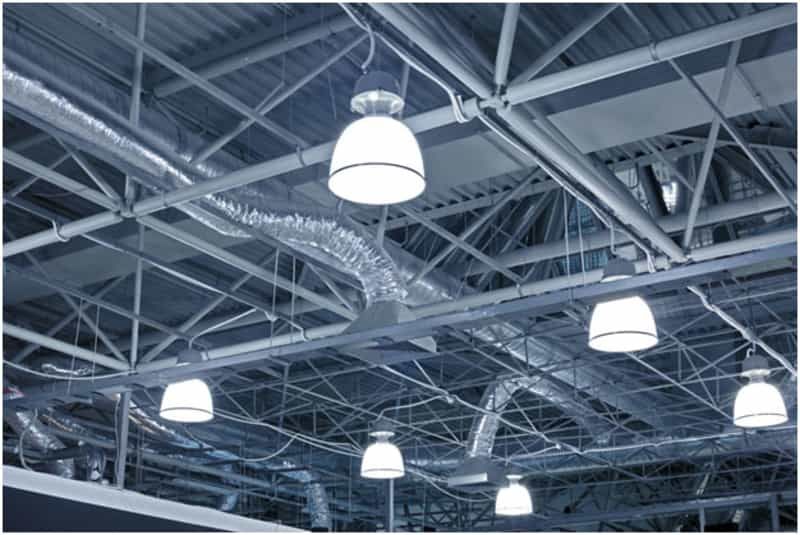Commercial and industrial spaces need strong, effective lighting that can light up big areas from high up. Because they use less energy and last longer, the best LED high bay lights are now the most popular choice for warehouses, factories, gyms, and stores.
What Are LED High Bay Lights?

LED high bay lights are special lights made for rooms with ceilings that are 20 to 40 feet high. These strong lights shine brightly over large areas, which makes them necessary for use in industry. Best high bay LED lights are better than traditional fluorescent or metal halide fixtures because they use less energy, cost less to maintain, and give off better light.
“High bay” doesn’t mean a certain type of fixture; it means the height at which it is mounted. These lights usually give off between 10,000 and 50,000 lumens, depending on what they are being used for. Modern best LED high bay lights use cutting-edge LED technology to provide bright, even light while using much less energy than traditional options.
Benefits of Choosing the Best LED High Bay Lights
Energy Efficiency and Cost Savings
Compared to regular metal halide or fluorescent high bay lights, the best LED high bay lights use 50% to 70% less energy. The U.S. Department of Energy says that LED high bay lights can cut energy use by up to 84% in industrial settings. A 150-watt LED high bay light can replace a 400-watt metal halide fixture and still give off the same amount of light.
Extended Lifespan and Reduced Maintenance
High-quality high bay lights last between 50,000 and 100,000 hours, while metal halide fixtures only last between 15,000 and 20,000 hours. This longer life greatly lowers the costs of maintenance and downtime in business operations. Based on 12 hours of use every day, an average LED high bay light can last for 11 to 22 years.
Superior Light Quality and Control
Modern best LED high bay lights turn on right away, so you don’t have to wait for metal halide lights to warm up. They also have higher color rendering index (CRI) ratings, which are usually between 80 and 90. This makes sure that colors are shown correctly in work settings. Advanced models have smart controls and dimming features that help you use less energy.
Environmental Impact and Sustainability
LED technology doesn’t use any hazardous materials or mercury, so the best high bay LED lights are good for the environment. They also don’t give off much heat, which lowers HVAC costs in conditioned spaces. Less energy use means less carbon emissions and a smaller impact on the environment.
Key Features to Consider When Selecting the Best LED High Bay Lights
Lumen Output and Light Distribution
The brightness of your high bay lights depends on how many lumens they put out. Most industrial areas need 200 to 500 lux of light, which means that the number of lumens needed depends on the height of the mounting and the area that needs to be covered. The best LED high bay lights come with a range of beam angles, from narrow 60-degree spots to wide 120-degree flood patterns.
Wattage and Energy Consumption
Modern high bay LED lights come in wattages from 100 to 500. The higher the wattage, the more lumens they put out. The lumens per watt rating shows how well the fixture works. The best units get 130 to 160 lumens per watt.
Color Temperature Options
The best LED high bay lights are available in various color temperatures:
- 3000K (warm white) for comfortable working environments
- 4000K (neutral white) for general industrial applications
- 5000K (daylight white) for detailed work requiring color accuracy
- 6500K (cool white) for maximum alertness and productivity
Durability and IP Ratings
Strong construction is necessary in industrial settings. IP65 or IP66 ratings for dust and moisture protection are what make the best high bay lights. For the most durability, look for fixtures with polycarbonate lenses that won’t break and aluminum housings that have been powder-coated.
Types of Best LED High Bay Lighting Solutions
UFO High Bay Lights
Best UFO-style LED high bay lights have a small, round shape that lets light spread out in all directions. These lights are great for open warehouses because they are made of aluminum, which lets heat escape easily. UFO high bays usually have power levels between 100 and 500 watts and give off light in a consistent pattern.
Linear High Bay Lights
Linear best high bay LED lights have a long shape that works well in narrow aisles or on assembly lines. These lights can be easily connected in long runs to provide directional lighting without any gaps. Linear high bays work especially well in stores and factories.
Round High Bay Lights
Traditional round high bay fixtures offer familiar aesthetics while incorporating modern LED technology. These best LED high bay lights provide excellent light distribution and are often preferred for retrofitting existing installations due to their compatibility with standard mounting hardware.
Installation Considerations for Best High Bay LED Lights
Mounting Height and Spacing
Proper spacing ensures uniform illumination without creating dark spots or excessive overlap. For 20-foot mounting heights, space fixtures 20-25 feet apart. At 30-foot heights, increase spacing to 25-30 feet. Best LED high bay fixtures with wider beam angles require less overlap and can be spaced further apart.
Electrical Requirements and Controls
Most high bay lights operate on standard 120-277V or 347-480V electrical systems. Consider fixtures with 0-10V dimming capabilities for energy optimization and occupancy sensor compatibility. Smart controls can reduce energy consumption by an additional 20-30% through automated scheduling and daylight harvesting.
Safety and Compliance Standards
Ensure selected best LED high bay lights meet relevant safety standards including UL, DLC, and Energy Star certifications. DLC qualification ensures utility rebate eligibility, while UL listing guarantees electrical safety compliance. FCC compliance prevents electromagnetic interference with other equipment.
Top Performance Metrics for Best LED High Bay Lights
Efficacy and Performance Data
Leading best high bay LED lights achieve efficacy ratings of 130-160 lumens per watt. For comparison, metal halide fixtures typically achieve 75-100 lumens per watt, while fluorescent high bays reach 85-95 lumens per watt. The Department of Energy reports that premium LED high bay lights can achieve up to 180 lumens per watt in laboratory conditions.
Warranty and Reliability Statistics
Quality manufacturers offer 5-10 year warranties on the best LED high bay products. Industry statistics show LED high bay failure rates below 1% annually when properly installed and maintained. The L70 rating indicates when the LED output drops to 70% of its initial lumens, typically occurring after 50,000-100,000 hours of operation.
Cost Analysis and Return on Investment
Initial Investment vs. Operating Costs
Best LED high bay lights cost more upfront than regular lights, but they cost a lot less to own in the long run. A 200-watt LED high bay light usually costs between $150 and $400, while a metal halide light of the same wattage costs between $100 and $200. But LED lights save $50 to $100 a year on energy costs for each light.
Utility Rebates and Incentives
A lot of utility companies will give you money back if you install the best high bay LED lights. For DLC-qualified products, rebates usually range from $30 to $100 per fixture. Some areas give extra tax breaks for upgrading to energy-efficient lighting, which makes return on investment calculations even better.
Payback Period Analysis
Depending on the types of fixtures already in place and how many hours they are used, the average payback period for the best LED high bay lighting retrofits is between 1.5 and 3 years. Facilities that are open 24 hours a day, seven days a week get their money back faster because they save more energy.
Maintenance and Troubleshooting Guide
Routine Maintenance Requirements
The best high bay lights need less maintenance. To keep the best light output, clean the lenses of the fixture once a year and check the mounting hardware to make sure it is safe. After 10 to 15 years, LED drivers may need to be replaced, but this is usually covered by extended warranties.
Common Issues and Solutions
Flickering in the best LED high bay lights often means there are problems with the driver or the electrical system. If there isn’t enough ventilation or the temperature is too high, the output may dim. Most good fixtures have thermal protection built in to keep them from getting damaged when they get too hot.
Future Trends in Best LED High Bay Technology

Smart Controls and IoT Integration
Next-generation best high bay LED lights add wireless connectivity so that you can monitor and control things from a distance. These systems can automatically schedule tasks, send alerts for predictive maintenance, and show you how much energy you’re using right now. By connecting to building management systems, you can fully optimize your facilities.
Advanced Sensor Technology
Modern best LED high bay fixtures include integrated occupancy sensors, daylight harvesting capabilities, and emergency battery backup systems. These features further enhance energy savings and provide additional functionality beyond basic illumination.
Frequently Asked Questions
How long do LED high bay lights typically last?
Best LED high bay Lights usually last between 50,000 and 100,000 hours, which is 11 to 22 years of use for 12 hours a day. This lasts 3 to 5 times longer than regular metal halide or fluorescent lights, which cuts down on the cost of replacing and maintaining them.
What wattage LED high bay light do I need?
The wattage you need depends on how high you want to mount it, how big of an area you want to cover, and how bright you want it to be. A 150-200-watt LED high bay light is usually enough for ceilings that are 20 feet high. Think about using 200–300-watt fixtures for ceilings that are 30 feet high. For most industrial uses, figure out about 1–2 watts per square foot.
Can LED high bay lights be dimmed?
Yes, many best high bay LED lights offer dimming capabilities through 0-10V controls, DALI systems, or wireless controls. Dimming can reduce energy consumption by 20-50% depending on the dimming level, and provides flexibility for different operational requirements.
Are LED high bay lights suitable for cold environments?
Best LED high bay lights perform excellently in cold conditions, often better than traditional alternatives. Unlike fluorescent fixtures that struggle in cold temperatures, LED lights maintain full brightness and efficiency in sub-zero conditions, making them ideal for cold storage facilities.
How much can I save by switching to LED high bay lights?
Switching to the best high bay LED lights typically reduces energy consumption by 50-70% compared to metal halide fixtures. For a facility with 100 high bay lights operating 12 hours daily, annual savings can range from $15,000 to $25,000, depending on local electricity rates and existing fixture types.



